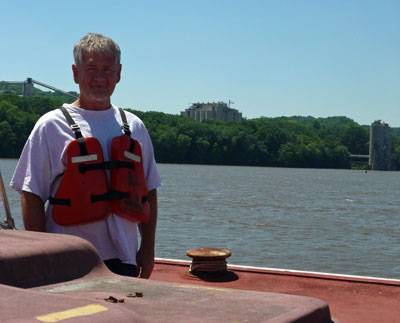A Day in the Life of a Towboater: Part II
Part II: Captain Rusty & the Upper Mississippi
Story & Photos by Raina Clark, From MarineNews September 2010
In early July, Raina Clark, Managing Editor for MarineNews, spent eight days on the Upper Mississippi and the Illinois Rivers on towboats — the Theresa Wood and the Thomas E. Erickson. Both vessels are chartered by AEP River Operations and owned and operated by Marquette Transportation. Raina traveled first aboard the Theresa Wood on the Mississippi River from Winfield, Mo. to Guttenberg Wis. Then she crossed the state of Illinois to catch the Thomas E. Erickson southbound on the Illinois River from Pekin, Ill. back to the confluence of the Mississippi River.
“What kind of pelicans are those?” I asked Captain Rusty Joyner on my third day aboard the Theresa Wood. Pointed north, the boat waited inside the gates of Lock 14 for the water to lift her to the level of the next stretch of the Upper Mississippi. I’d taken all the photos I could of this particular lock and stood watching big Pelicans sweep by on giant wings, tilting their heads and eyeing me as they passed. The Captain, a native of Kentucky and 32-year towboating veteran, had been standing in front of the pilothouse controls gazing up river. He turned his whole body to look out the aft windows and paused in thought before coming to a conclusion. “White,” he said and turned back again to contemplate the view up river.
I should have seen that one coming. I shook my head and smiled, watching two of the generic pelicans bob on the water inside the lock walls, passing unconcerned through the gates along with the boat, like white bathtub toys.
For the first few days, when I sat too quietly on the pilothouse’s small couch, downloading my thoughts from the day into my laptop, Captain Rusty would turn and wave to a boat off in the distance. When I looked out to see who he was waving at, there was nothing there. He would turn back to his controls with a little smile, not saying a word. He did this half a dozen times before I was able to stop my head from turning every time he waved. Even then, I would wait half a minute, then sneak a look out the window just to be sure there really wasn’t anything there. He caught me at that a couple times too.
Being able to laugh at yourself, and letting others laugh at you too, is key to surviving in a towboater’s world Captain Rusty said. I supplied a lot of laughs over the five days I was aboard. The crew doesn’t miss a chance to give someone a hard time about something. Not even the Captain is immune. Besides requesting baked chicken and salads from the galley, Captain Rusty walks the length of the tow and back a dozen or more times each day to balance the sedentary job of piloting a towboat. After just a few laps down the gunwales of the barges, staring at the monotonous view of orange steel walls rising above your head on either side, you quickly lose count of how many times you’ve come and gone. Captain Rusty used to track his laps with piles of pebbles on the cover of a barge closest to the crew locker area at the head of the boat, where the deckhands often hang out. “I figured out that the crew was sneaking pebbles into my pile,” he said, laughing. “Now I keep my pile at the head of the tow.”
Chief Engineer, Mike Shaffer was serving as relief engineer while I was aboard the Theresa Wood. He has also spent his life on towboats and now has a son who is a Captain for Crounse Corporation.
“This Captain is a real by the book guy,” he told me, explaining that Captain Rusty keeps a tight ship and expects each of the crew to pull their weight. “The boat wouldn’t work without every one of these guys doing their job well.” There’s no room for anyone to slack off with the crew reductions boats have had to deal with, Mike said. Companies have done away with the assistant engineer position and cut the crew down to five deckhands.
While Captain Rusty expects a lot from his crew, he works hard to build a team that works well together and to create a comfortable working and living environment.
“I’ve got guys ready for promotion,” he said. “But they don’t want to leave the boat. They put a lot of work into this boat and they’re proud of it. And I’m proud of them.”
During the Captain’s morning shift, a deckhand is tasked with cleaning the pilothouse. Captain Rusty often pitches, in washing down windows or whatever else needs to be done. He described to me the improvements the crew had already made to the interior of the boat and the projects that were still on the list. “This is our home,” he said and to his way of thinking, the more the crew takes ownership of their home-away-from-home, the happier they will be.
A deckhand or cook coming into the towboat industry for the first time is assigned a job on whatever boat is short-handed. Most look forward to finding a crew they work well with and hopefully being assigned as a regular, giving them more predictable work cycles and a chance to be with the same people over time. For the most part, the crew is hand-picked by the Captain so they know they have to be good at their jobs to be invited on as a regular and to stay that way.
A few days into my trip we were waiting in a bend in the river for our turn to go through another set of locks. The Captain had the Theresa Wood tucked to the side of the navigational channel with the bow of the tow pointed into the lush summer trees. I stood on the uppermost deck looking across the flat river waters, trying to make out the vessel we were waiting on. With an hour or so to wait I went back inside the pilothouse where I found the Captain sitting in his chair speaking with Don Collins, a deckhand on his first trip aboard the Theresa Wood. Over the past weeks, Captain Rusty had been impressed by Don’s work ethic and ability to get along with the rest of the crew.
“Don here just agreed to come on regular,” Captain Rusty said with a big smile. There were congratulations and handshakes all around.
On my last day, I woke to the sound of the boat horn. We were preparing to pass through one of the narrowest bridge openings on the Upper Mississippi, the Clinton Railroad Bridge swing span between Clinton, Ia. and Ill. Pleasure craft zoomed along trying to beat the boat through the navigational channel which is only the width of the swing span. Pilot Tim Richards eased the tow through the 177-foot swing span like he was threading a needle. He had to go through at an angle because the bridge is built at a bend in the river just before a sand spit that juts out into the water. Almost within the length of the vessel, we also had to pass under an auto bridge.
“This is the highest paying 15-barge river because of these bridges,” Tim said when I made it up to the pilothouse to watch and hold my breath. Pay rates for pilots and captains differ depending on what river or section of river they’re plying. The Upper Mississippi features more navigational obstacles in the way of locks and railway and auto bridges than about any other stretch of river. Later on in the day we approached the Sabula Railroad Bridge connecting Sabula, Ia. and Savannah, Ill. As we went up river we passed a tow vessel that had come to a stop to pump water out of one of its barges. It had rubbed against the bridge on the way down. Coming down the river pilots have to contend with higher speeds, making obstacles and currents even more dangerous.
The work of the mates and deckhands is also different on the Upper Mississippi than on other, less eventful stretches of the inland waterways. Senior Mate Todd Richardson said he prefers working this part of the river because the frequent lock work breaks up the monotony that comes with living and working on a boat 24/7 for a month at a time. Every few hours the crew is out on the tow, talking the Pilot or Captain into the lock, breaking lines, moving the tow through the gates, making lines again and maybe chatting with the lock staff. On the lower Mississippi, Todd said, there are many more slow hours dedicated to cleaning and polishing.
Along with unique navigational challenges, the Upper Mississippi hosts its own style of home-made craft built in the romantic image of Tom Sawyer and Huck Finn.
“They have signs on them that say ‘New Orleans or Bust,’” Captain Rusty told me. Todd, who was standing nearby during this particular conversation, described one of the build-it-yourself craft he’d seen along this portion of the river. “It looked like an outhouse with outboards,” he told me. Then he turned to Captain Rusty with a straight face. “They were all set,” he said. “They even had Furuno on it,” and he pointed his finger into the air and twirled it around.
“Yeah, I bet they did,” Captain Rusty said, giving Todd the chuckle he was looking for.
I waited in the crew’s lounge for the last hour or so before we reached Lock 10 in Gutenberg, Wis., where I would disembark and drive across Illinois to meet the Thomas E. Erickson on the Illinois River. As we passed by Cassville, Wis. the boat’s horn sounded again. Todd opened the door from the lounge to the first deck and pointed out the home of Marquette Transportation founder Ray A. Eckstein on the bank of the river. He explained that all Marquette boats sound off every time they pass Eckstein’s brown brick house. Shortly after that, Captain Rusty’s morning shift in the pilothouse ended and he stopped into the lounge to say goodbye. Despite all his hard work building the dream crew, he said the reality is: “This is the way it goes with towboating. Just as soon as you get used to having someone around, they’re gone.”











